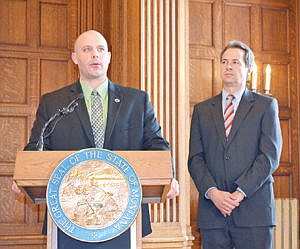Bullock signs controversial water compact
Gov. Steve Bullock signed the bill to ratify the Confederated Salish and Kootenai Tribes Water Compact into law Friday afternoon, despite a lawsuit filed to block the controversial agreement. Bullock was accompanied by Sen. Chas Vincent, who championed the bill through the Legislature, and by tribal chairman Vernon Finley.
The suit was filed April 20 in the Montana Twelfth Judicial Court in Lake County by the Flathead Joint Board of Control and eight of its members, Jerry Laskody, Boone Cole, Tim Orr, Ted Heins, Bruce White, Shane Orien, Wayne Blevins and Gene Posivio and requests the court to declare the law dead on the grounds it violates the Montana Constitution.
“Despite Montana Constitutional requirements, both the Montana Senate and the Montana House of Representatives voted to pass SB262 by less than a two-thirds vote. Accordingly, any attempt to execute, transmit and/or implement SB 262 is illegal as it did not pass each of the respective legislative houses by a two-thirds vote sufficient to make it law, and therefore, does not meet constitutional requirements and should be declared dead as a matter of law,” the suit stated.
The primary claim of the suit is based in Section 18 of the Montana Constitution, which reads: “The state, counties, cities, towns and all other local governmental entities shall have no immunity from suit for injury to a person or property, except as may be specifically provided by law by a two-thirds vote of each house of the legislature.”
The plaintiffs claim the compact is unconstitutional because it creates an immunity from suit, but was not passed by a two-thirds majority of each house.
The immunity is written into page 76 of the ratification bill. “1-2-111. Immunity from Suit. Members of the board, the engineer, any designee, any water commissioner appointed pursuant to Section 3-1-114 of this ordinance, and any staff shall be immune from suit for damages arising from the lawful discharge of an official duty associated with the carrying out of powers and duties set forth in the compact or this ordinance relating to the authorization, administration or enforcement of water rights on the Reservation.”
The legislation also includes a waiver of the immunities granted by the Eleventh Amendment to the United States Constitution.
“Waiver of Immunity. The Tribes and the State hereby waive their respective immunities from suit, including any defense the State shall have under the Eleventh Amendment of the Constitution of the United States, in order to permit the resolution of disputes under the compact by the board, and the appeal or judicial enforcement of the board decisions as provided herein, except that such waivers or sovereign immunity by the Tribes or the State shall not extend to any action for money damages, costs or attorneys’ fees. The parties recognize that only Congress can waive the immunity of the United States and that the participation of the United States in the proceedings of the board shall be governed by federal law, including 43 U.S.C. Sec. 666.”
The legislation further limits the waiver of immunity in Part B, specifying nothing in the compact shall be construed or interpreted, “11. To constitute a waiver of sovereign immunity by the Tribes or the State except as expressly set forth in this Compact.”
The suit claims passage of the compact, with the immunity provisions, required a two-thirds vote of each house of the legislature. The bill passed the Senate with a vote of 31-19, two votes short of the two-thirds threshold. In the House, the vote was much closer at 53-47.
Dale Schowengerdt, Solicitor-General of Montana, defended the constitutionality of the compact during the legislative process.
“The short answer is that Article II, Section 18 clearly does not apply,” he wrote in an email. “Article II, Section 18 prohibits granting immunity to state and local government entities without a two-thirds vote of each house. That provision of the compact is a waiver of immunity (vis-à-vis the Eleventh Amendment), not a grant of immunity.”
Schowengerdt also pointed to judicial precedent and legislative action that has rendered the clause without significant meaning.
“The 1972 constitution changes the common law doctrine that states cannot be sued for damages by its citizens. Since then, the Legislature has granted the state and other agencies fairly broad immunity, see e.g. MCA Section 2-9-11, which the Supreme Court has broadened even further. As prominent commentators and scholars of the Montana Constitution have noted, ‘case interpretation coupled with an accumulation of statutory exceptions have drained the provision of any significant meaning.’”
The plaintiffs asked the judge for an ex parte temporary restraining order, essentially asking the judge to declare the law dead without a hearing and prior to allowing the state to present a defense.
Schowengerdt and Montana Attorney General Tim Fox filed their response April 22, claiming the plaintiffs’ attorneys failed to meet the standards required for the issuance of a temporary restraining order.
Montana law requires plaintiffs to demonstrate that a delay would cause immediate and irreparable injury to the applicant before a hearing could scheduled and the must either demonstrate the efforts made to give notice or that notice should not be required.
“Plaintiffs’ claim is essentially that someday there may be a lawsuit against CSKT Water Compact in which some plaintiff may try to get damages against the State, and the State may in turn claim immunity from damages based on the compact’s language, which Plaintiffs claim would violate Article II, Section18 of the Montana Constitution absent the compact passing the Legislature by a two-thirds vote,” the response stated.
The response argued a restraining order is not justified because the threat of harm is speculative and not immediate. The compact is far from implementation, requiring ratification by both the tribes and the United States government, and as such poses no immediate threat of harm.
The response further argues the claims of injury pertain only to monetary damages, which is not a valid reason for injunctive relief as court precedent has determined that monetary loss is not considered to be irreparable harm.
The response further argues the plaintiffs don’t have standing to bring the suit to court because the Flathead Joint Board of Control is not a property owner and hence could not suffer harm.
“The Joint Board of Control is not a property owner that would suffer harm, even under Plaintiffs’ far-fetched hypothesis,” the filing stated.
The final argument issued in the response was centered around the perceived political motivation behind the suit.
“It takes little imagination to predict the mischief that plaintiffs’ attorneys could create by inventing last minute claims that a bill is unconstitutional, and then suing for a temporary restraining order on that basis before the bill is even implemented or applied against actual plaintiffs. That is precisely what the political question doctrine prevents, and it is precisely what Plaintiffs have done here. Plaintiffs cite no authority supporting their novel argument that they can simply enjoin the Governor from signing a law simply because some opponents of the law believe it to be unconstitutional. As courts have repeatedly held, the manner in which the Legislature passes a law is a non-judiciable political question, and this is certainly no exception.”
The response did not address the suit itself, just the request for a temporary restraining order, which was not issued before Gov. Bullock signed the bill Friday afternoon.




